12 - The Environment
Published online by Cambridge University Press: 04 August 2020
Summary
History of Globalization
The Long Nineteenth Century
Environmental regulation by states has a long, if limited, history, but its globalization is recent. Greece's Solon the Law-giver proposed in the sixth century BC that agriculture should be banned on steep slopes to prevent soil erosion; Pisistratus introduced a bounty for farmers who planted olive trees to counter deforestation and overgrazing (Davies 1997: 99). Most of the important events in the history of the globalization of environmental regulation, however, have occurred since 1970. Yet there were some significant beginnings to the globalization process in the nineteenth century. Most of the pre-1970 international initiatives were not about protecting the environment for its own sake but about instrumental human concerns. In 1868, the first international instrument to propose restrictions on chemicals, the St Petersburg Declaration, sought to prevent the use of incendiary or fulminating substances in war (Martens 1985). This was followed by the 1899 Hague Declaration and, in the twentieth century, by extensive global efforts to limit or ban chemical and then nuclear weapons (Schindler & Tornau 1985). Chapter 13 deals with those regimes in greater detail.
The year 1868 was not only the date when humanity began to respond to the most catastrophic threat to the environment - from weapons of war - it was also the date of an assembly of German farmers and foresters which after another thirty-five years of lobbying, largely through International Ornithological Congresses, led to the 1902 European treaty on the Conservation of Birds Useful to Agriculture (Caldwell 1988: 17). The fact that the International Ornithological Congresses of 1891, 1893 and 1900 were the lobbying platforms for the treaty calls into question any view that the initiative was purely about economic interests. Early efforts at globalizing environmental regulation may have been articulated in a discourse of economic development, but that does not mean that the activists behind the treaties were motivated only in these terms. The same is true of the 1900 Convention for the Preservation of Animals, Birds and Fish in Africa, signed by European colonial powers with the primarily (but not exclusively) economic motivation of limiting ivory exports (Brenton 1994: 16).
- Type
- Chapter
- Information
- Global Business Regulation , pp. 256 - 296Publisher: Cambridge University PressPrint publication year: 2000



